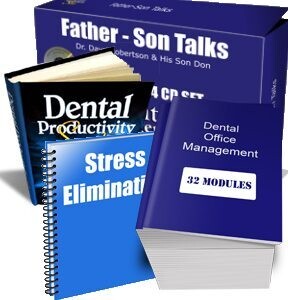Dental Practice Management Blueprint
Practice Management Blueprint
What is dental practice management?
I write, consult and speak on practice management. So what the heck is it anyway?
Practice management is the art and science of creating success in your dental practice.
So what then is success?
Now please do not confuse practice success with clinical success.
Most of our training and continuing ed courses are designed to improve our clinical excellence and by extension our clinical success. In other words can you do excellent dentistry that works well for the patient?
Dental practice management success begs the question that only Dr. Phil could ask: your dentistry may be working well for the patient, but how well is it working for YOU?
You might do excellent dentistry but it takes so long, that it is not profitable. Or you might do nice work but no one says yes to treatment. Or you are the best in town, but the stress of dealing with patients is killing you. Or you might do great work, are profitable, not under stress, but just aren’t enjoying dentistry. Or maybe everything works well, but you just don’t have enough patients; it doesn’t help you to do a crown in 15 minutes if you have a 2 hour opening right after it.
Even though practice management is thought of as kind of a small subset of dentistry, there are just as many issues and factors to consider as there are in achieving proficiency clinically. Just look at the program for any dental convention. Practice management instruction is generally far less than 5% of the topics to choose from. And they are just as important, and in some ways more important.
In fact some people would not even go to a practice management seminar. They look down on this type of thing. They think is less than professional, or for greedy dentists who want more money or will destroy the integrity of the profession by promoting misleading ads that steal patients from good dentists like them. And some practice management courses probably are guilty of that.
And certainly there are dentists who resort to low class ways to promote themselves and are greedy. But that is not what practice management or in particular practice management excellence is all about.
Practice management is the means by which you operate you practice. Picture a practice the opposite of the one I just described; it is of the highest integrity, well respected, high performance, great, motivated staff, high acceptance of treatment, everything working just right.
None of that happens by accident. To be the best, you need to be a good practice manager. And this involves the entire office staff. I can do excellent dentistry without a good receptionist, office manager, without a good assistant, and if I really had to without any assistant at all (although it would take a lot longer). But I cannot have an excellent successful practice on my own; everyone needs to be in on it and doing a great job.
So what are some of the issues to consider if you want to consider your practice a success?
What you like: type of dentistry; hours; people you work with; challenge;
Relationship development; this is at the core of staff retention and patient retention; if people know you care about them they are far more likely to care about you. And therefore more likely to stay. Oh, by the way, and a lot more interesting, fun and satisfying for you.
Money: the ultimate paradox of dentistry; the harder you try to make money the less you make; the more you try to do your best even if it costs you money, the more you will make. People are strongly repelled by someone out for your money. Money is more like a scorecard. It is proof whether you’re doing a good job or a bad job because money goes where it is well treated.
Stress: why does money matter at all if you are stressed, depressed, unhappy, moody, suicidal?
Ability to sell: so you are the best in town, but no one gets the treatment you can do so well because you don’t offer it, you offer it so poorly that they don’t accept it or worst of all, present it in a way that the patient feels pressured and leaves your office and has the work done by your competitor down the street at half the level of quality you are capable of.
Dental Marketing: you can’t sell to them until they are sitting in your chair
Organizational skills: more patients are lost from practices because of administrative and clerical screwups than bad dentistry or dislike of the dentist. Can we say ‘fee misunderstandings’ here??
Efficiency: Your patients love you, you can market, you can sell, you can do beautiful work. There are no financial surprises and the happy patient pays the bill in full and refers 2 others. Your staff adores you and will do anything for you. What could be wrong here? Only one thing; what if you are so slow and/or inefficient that you don’t generate any profit?
Vision: This is your typical business buzz word, but it really is important. How can you have practice success if you don’t know what your practice should look like when it is just the way you want it? How big? What type of work? How many dentists? Any partners? Associates? How much time off? How much are you netting? The analogy I like is the 2 guys trying to hack their way out of the jungle with a machete. One guy is a hard worker and hacks away 12 hours a day. The other stops every hour, climbs a tree and makes sure he is getting closer to the place he wants to get to so that all the work with the machete is not wasted. The other guy is working harder, but will not get out the jungle as soon and maybe not at all.
Team: A great team will make or break your practice. So how do you get and keep a great team? There are lots of things involved here. You need to be able to identify great talent and great people. But you also need to keep them. Some dentists are excellent judges of character and all the factors that make great staff; make great hiring decisions, but then they are not nice to them! So guess what, they leave.
Too many dentists take their clinical perfectionism and translate that into the expectations they have for their staff. And the truth is, most of us have or have had staff members that are so good that they do seem perfect so all others are judged against that standard. Well, if you have some people like that, show your appreciation! And because people are not perfect, take it easy on the ones who make mistakes. If their attitude is good, help them improve. If their attitude is bad, give them a chance to change it, and if they won’t, move on to someone else.
Most dentists have no idea how many good staff they have lost because they kept someone that had a bad attitude or weak work ethic. Good staff will cover for someone who is not pulling their weight for a while, but if nothing is done the unfairness of the situation usually causes them to leave. “Why should I bust my butt while she sits in the back making personal calls all day?”
Backbone: The last point ties directly into this one. We dentists feel that we have to be nice to succeed. Nice to patients. Nice to staff. After all who wants a dentist or a boss who is not nice? And there is nothing wrong with nice. Nice is good. But nice is not enough. It is totally inappropriate to be nice in certain situations. Is someone is damaging your practice, you need to deal with that. You need to be polite, but you also need to be firm in some situations. After all, we are paying people to do a job. They are going to expect to be paid at the end of the month, so why shouldn’t we expect them to do what we paid them to do during the month?
I’m not saying this is easy or fun. But the fun comes when you have a great team. So you sometimes need to go through the pain of discipline or termination in order to get a team that is committed and hard working and is just as focused on looking after your patients as you are. Your team needs to know that although you are nice, you also have standards that you expect them to meet. Because the whole team is watching how you deal with the weak link, slacker or ‘cancer’ in the office. What you put up with for them will be expected by everyone.
Whenever he had a difficult staff issue to deal with, a friend of mine used to say “I’m going to have to take a backbone stiffening pill to deal with this”. And he would. And his business continued to grow and prosper. He didn’t like doing it. But it comes with the territory of being in business. If you want to be nice all the time, be a dentist and work for a businessperson or get a government or teaching position.
Business mindset: This ties right in here. You might say, I am a professional and I am concerned with my patients and with quality dentistry, not dirty things like profit and money. Well that’s fine, and ties right into point number one: what do you like? If you are caring and compassionate and just want to help people, then you probably should be in a salaried position, a community clinic, or an associate. Because by owning a practice, by definition you are in business. And the purpose of any business to maximize profit. So if profit is not important to you, being in business is not going to be fun, because your competitors are interested in profit, your bank, suppliers, leasing company, landlord, lab and staff all want to be paid. And it is not good enough for them that you really helped someone this month. So either be in business and do it right, or be a dentist and focus on helping people and quality dentistry and don’t put all the pressures and liabilities onto yourself.
Do you see what I am saying here? Dentistry is not a business. Owning a dental practice is a business. Decide if you want to be a dentist or a businessperson. They are not the same and the skills required are not the same, and the definition of success is not the same. I have 10 associates. They are all dentists. They do not own a practice, did not sign a 5 year lease that obligates them to pay rent every month for 5 years whether you have the money or not, did not borrow hundreds of thousands of dollars, do not worry about marketing, payroll, systems, labor laws, cash-flow, advertising, staff evaluations, hiring, firing, etc etc. They just worry about patients, teeth and good dentistry. And there is nothing wrong with that. Most professions learn their trade and then go work for someone else. I have had associates for over 20 years.
There is nothing wrong with being a dentist. Dental practice management skills are for people who want to be a businessperson as well.
We do Dental Consulting worldwide; on the phone and in person.
If we can help, call any time; (587)-391-5883 in Canada Mountain Standard Time or email info@dentalmanagementsecrets.com
All for now.
Dr. Dave











